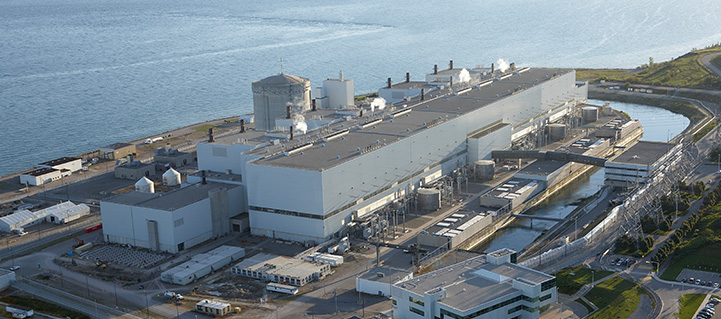Trades workers and supervisors tasked with refurbishing the Darlington and Pickering nuclear facilities were told to leave their jobs last week due to a “concerning trend of safety incidents,” Global News has learned.

The information was obtained from an internal email sent to employees by senior officials at Ontario Power Generation (OPG) – the provincially owned company responsible for managing the nuclear plants.
The email was sent by OPG at 2 p.m. last Thursday. It said that trades staff and supervisors from SNC-Lavalin and Aecon – the companies responsible for much of the work at the $12.8-billion Darlington refurbishment project – would be sent home “shortly” to think about their safety performance.
“Employees are encouraged to take this time to reflect on the importance of working safely and return to work with a renewed personal commitment to always working safely on the job,” the email said.
The email also stated that despite OPG’s continued focus on safety, the concerning trend of incidents was “not improving.” According to the email, this lack of improvement led the companies to order their employees to “stand down.”
READ MORE: Key project at Darlington nuclear facility hundreds of millions over budget, delayed

The email continued, saying supervisors from SNC-Aecon would return to the job the following day to develop a plan focussed on the “safe execution of their work.” Employees would not be allowed back to work until this plan had been approved, said the email.
OPG responds to safety concerns

Get breaking National news
OPG spokesman Neal Kelley confirmed the validity of the email in a phone call Monday.
He also said in a written statement that such stand downs are “common” in the nuclear and large-scale construction industries.
“Safety stand downs are a standard and common industry practice,” the statement said. ” On any well run project, it is normal to stop work for a safety stand down from time to time, to build a strong safety culture and get ahead of any potential events.”
But comments from SNC-Aecon seem to challenge this assertion. Saying that while stand downs do happen periodically to promote workplace safety – such as during the annual Safety Week – this is the first time that a stand down of this nature has been ordered by the companies.
“This is the first time where we have asked the crews to remain offsite for a period of time while the supervisors remained on site,” said Nicole Court, a spokesperson for Aecon.
OPG, meanwhile, says that at no time did this stand down present any threat to the nuclear facility itself.
“This safety stand down is in no way related to nuclear generation operations,” the statement said. “The Darlington 2 Refurbishment is an isolated construction project with clear physical barriers in place and is separate from the operating station.”
READ MORE: Contractors told to ignore risks, lower cost estimates at Darlington nuclear plant, auditors say
The company also says that since the beginning of the refurbishment in January 2010, “no lost time injuries have been incurred” at the project.
According to the company, that’s nearly 2,900 days – or roughly 10-million working hours – without a workplace safety accident causing delays to the overall refurbishment.
- Federal government raises concerns over OpenAI safety measures after B.C. tragedy
- Free room and board? 60% of Canadian parents to offer it during post-secondary
- Ipsos poll suggests Canada more united than in 2019, despite Alberta tensions
- Indigenous leaders outline priorities for spring sitting of Parliament
SNC-Aecon – also referred to as the ‘Joint Venture’ – says the stand down was proactive in nature and that the companies hold their workers to the “highest of standards” when it comes to workplace safety.
“Since initiating the safety stand down, we identified enhancements in our procedures and practices,” said Cliff Eubanks, Joint Venture project director.
OPG and SNC-Aecon confirmed that workers began slowly returning to the job site on Saturday and that as of Monday morning all employees were back to work.
WATCH: OPG insists Darlington refurbishment within budget, despite cost overruns at heavy water storage facility

Global News asked both OPG and SNC-Aecon to provide specific details of the “significant issues” that necessitated sending all the workers home, but neither OPG nor SNC-Aecon answered this question directly. Instead, OPG said the problems were related to “potential conventional workplace safety issues” that can arise on any large-scale project.
Meanwhile, the Canadian Nuclear Safety Commission (CNSC) says it is keeping a close eye on the situation.
“CNSC staff have been monitoring the events and meeting regularly with OPG management to discuss corrective actions,” said Aurèle Gervais, a spokesperson for CNSC. “OPG’s support of this decision aligns with CNSC’s expectations … staff on site will continue to monitor.”








Comments
Want to discuss? Please read our Commenting Policy first.